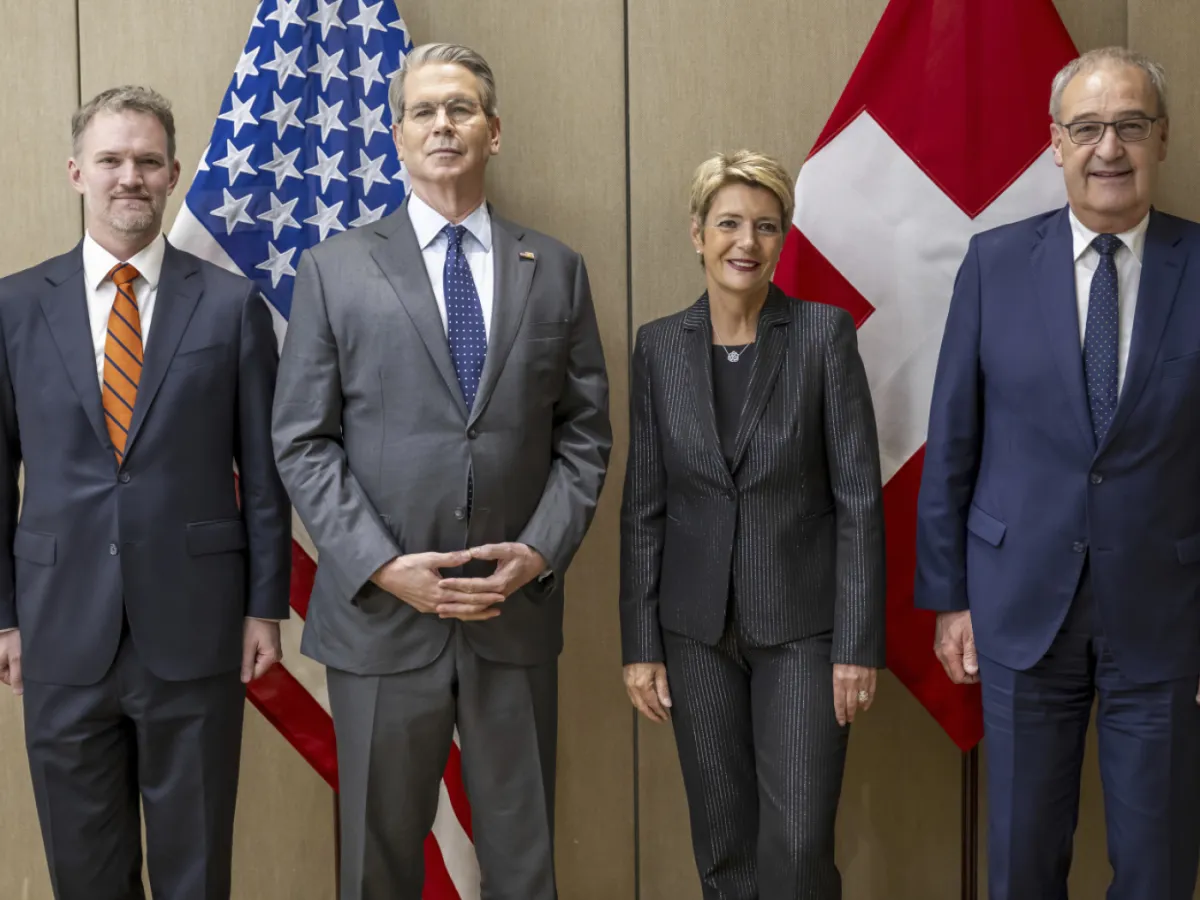Switzerland’s U.S. Trade Deal Sparks Debate Over Economic Gains and Sovereignty
Switzerland’s U.S. Trade Deal Sparks Debate Over Economic Gains and Sovereignty
By
Rachel Steinberg
Last updated:
November 18, 2025
First Published:
November 30, 2025

Photo: Swissinfo
Framework Agreement Brings Relief and Controversy
Switzerland’s newly announced trade deal with the United States is drawing mixed reactions as government and business leaders hail it as a “restart” for bilateral trade, while critics accuse officials of bowing to U.S. pressure. The framework deal, unveiled last Friday, cuts duties on Swiss exports from 39% to 15% and includes pledges from Swiss companies to invest $200 billion in U.S.-based operations, including expanding manufacturing capacity.
Ahead of the announcement, Switzerland deployed a high-profile delegation of top executives from luxury and industrial giants, including Rolex and Richemont, to Washington. The delegation reportedly presented gifts such as a gold Rolex watch and a custom gold bar to President Trump as part of a charm offensive to secure favorable terms.
Political and Public Backlash
Critics, particularly the Green Party, have denounced the deal as a “surrender agreement,” suggesting Swiss economic elites and the Federal Council compromised national interests. Party leader Lisa Mazzone argued that consumers and farmers may bear the costs of concessions, while questioning the role of business leaders in lobbying the White House.
Swiss Economy Minister Guy Parmelin, however, defended the deal and the involvement of CEOs. “We haven’t sold our soul to the devil,” Parmelin said, emphasizing that the framework provides a foundation for future negotiations. He also acknowledged that business leaders’ presence in Washington helped clarify Switzerland’s trade positions, although he noted it was not a deciding factor in the agreement.
Opportunities and Economic Implications
Swiss industry leaders welcomed the framework, highlighting the relief from high tariffs that have hampered exports. Stefan Brupbacher, CEO of Swissmem, which represents mechanical and electrical engineering companies, noted exports had dropped between 15% and 40% since August due to the previous 39% duties. The new 15% rate aligns Switzerland with European and Japanese competitors, creating a platform to “restart” trade with the U.S.
Despite optimism, some uncertainties remain. Questions linger over whether Switzerland will need to accept controversial U.S. meat imports, such as chlorinated chicken or hormone-treated beef, within the agreed duty-free quotas. The framework is also non-binding, requiring additional negotiations, parliamentary approval, and potentially a public vote before full implementation.
Economic Outlook Amid Trade Deal
Recent data shows Switzerland’s economy contracted by 0.5% in the third quarter of 2025, largely due to declines in the chemical and pharmaceutical sectors. UBS economist Alessandro Bee projects modest GDP growth of around 1% for 2026, below the 1.9% 15-year average. While the trade deal may encourage investments, significant tariff reductions and the relocation of Swiss manufacturing to the U.S. could temper export growth and overall domestic economic momentum.
About half of Swiss exports to the U.S. come from the pharmaceutical industry, which was not affected by the prior high tariffs. Nonetheless, some Swiss pharma companies plan to shift U.S.-bound production stateside, potentially limiting the domestic benefits of the trade deal. Analysts caution that while the framework signals stronger U.S.-Swiss trade ties, its broader economic impact on Switzerland may be moderate in the near term.
Looking Ahead
The deal represents a strategic step in strengthening economic relations between Switzerland and the U.S., but it also underscores the delicate balance between gaining market access and protecting national interests. As further negotiations unfold, both political leaders and industry stakeholders will watch closely to assess whether Switzerland can capitalize on opportunities without compromising its economic sovereignty.
Popular articles
Subscribe to unlock premium content
Snow, Silence, and Splendor

The $60 Million Market for Ultra-Exclusive Executive Pop-Up Experiences

Conquering the Poles in Absolute Luxury

Snow, Silence, and Splendor

The $60 Million Market for Ultra-Exclusive Executive Pop-Up Experiences

Snow, Silence, and Splendor









